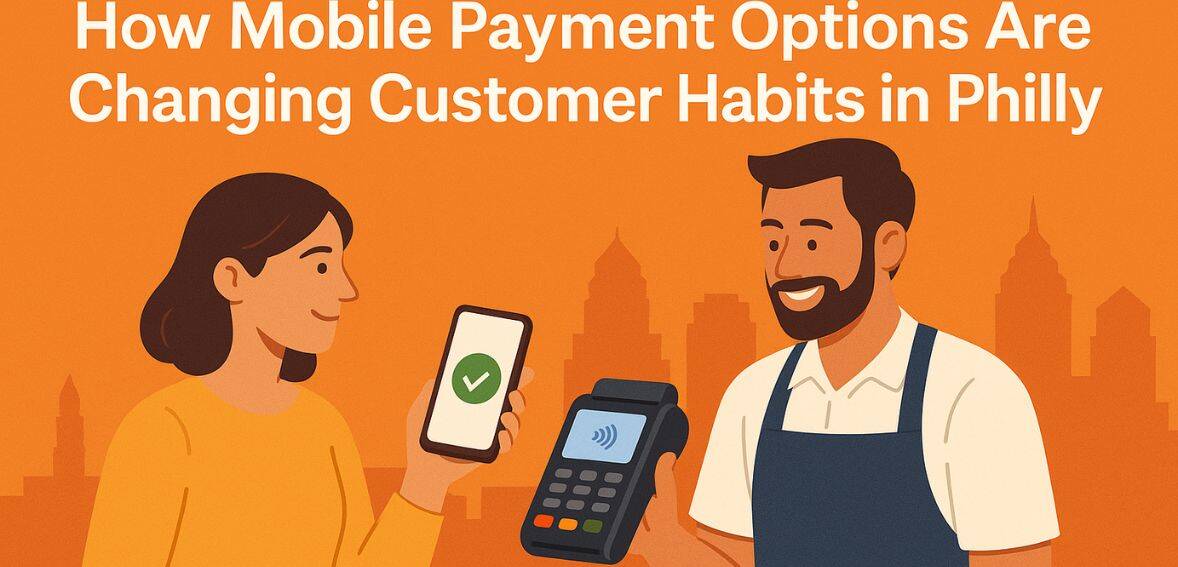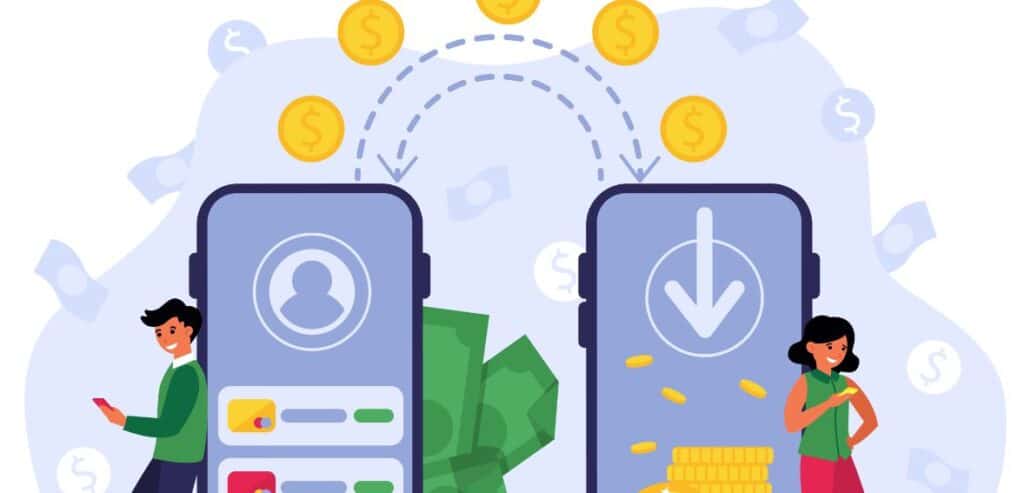
By Michelle Geoffrey July 17, 2025
From streetcars to subways, pre-paid tokens to smart cards, and now digital wallets, Philadelphia has always been a city of transitions. Mobile payment options are currently changing how local consumers live, commute, eat, and shop. The city’s payment habits are rapidly changing, with stadiums adopting contactless transactions, coffee shops in Manayunk and Center City boutiques offering smartphone wallets, and SEPTA transit offering tap-to-pay options. Beyond new technology, however, this change is affecting people’s behavior, including where they shop, how much they spend, and what they anticipate from Philadelphia businesses.
Why Mobile Payments Appeal to Modern Philly Consumers

A simple tap or scan lets wallets pay—forgoing the need to dig for cash or cards. According to a 2023 survey, convenience is the primary reason why almost half of consumers use digital wallets. Quick taps, no fumbling for cards, and faster checkouts make it the go-to choice. For younger users, perks like rewards and loyalty points sweeten the deal even more. And Philly’s no exception—locals are embracing the speed and simplicity just as eagerly.
Staff at Fat Lady Brewing report that cash makes up only about 6% of transactions—phones and cards handle the rest. Customers throughout the city, particularly Gen Z and millennials, are abandoning their wallets in favor of wallet apps, solidifying mobile payments as the norm rather than an exception.
Convenience and Transit: SEPTA’s Contribution to Wider Adoption
Surprisingly, SEPTA, Philadelphia’s regional transit system, has contributed to the acceptance of mobile payments. After testing contactless payments for buses and trolleys as early as late 2023, in April 2025, SEPTA made history as the first U.S. transit agency to add contactless payments on commuter rails.
Rapid acceptance is demonstrated by the fact that riders have recorded over 3.3 million contactless taps, generating $4.8 million in sales. Smartphone payments now feel standard, dependable, and integrated thanks to this transit shift, which has encouraged crossover behavior in Philadelphia’s regular retail, dining, and entertainment establishments.
How Spending Behaviors Are Changing in Philly
Using a mobile wallet changes how consumers make purchases. According to research, the “pain of paying” is reduced when digital wallets are used, which encourages more frequent and occasionally larger purchases.
As a result, you’ll see more spur-of-the-moment coffee runs, quick museum stops, and QR payments with local vendors. When mobile wallets are accessible, businesses in Center City and Manayunk have seen an increase in average spending, particularly from tech-savvy customers who value speed and ease.
Mobile Payments and the Psychology of Instant Gratification

Mobile payment systems capitalize on the psychology of instant gratification, which is a significant influence on consumer behavior in today’s digitally first world. The act of payment disappears when your phone does it—no cards, no cash, no pause. There is no actual money exchange, no hold-up, and no time for introspection. It has a strong influence on spending decisions because it is intuitive and seamless.
When using Apple Pay, Google Pay, or comparable platforms, Philadelphians—particularly younger demographics—are more likely to make snap decisions about what to buy. Customers can pay in seconds while passing a food truck in University City or a secondhand store in South Philadelphia, frequently without even taking out their card or entering their PIN.
This ease boosts spontaneity and decreases hesitation. Numerous local business owners have noticed that mobile payments not only expedite checkout lines but also raise the possibility of impulsive purchases, converting a passing interest into an instant sale. Although this behavior change is slight at the time, it has a huge overall impact on industries and neighborhoods.
Retail Shifts: From Vintage Shops to Food Halls
At Shibe Vintage Sports, digital wallets jumped from under 5% pre-pandemic to almost 18% in 2023. In contrast, patrons of casual dining establishments and food hall stalls prefer mobile payment lines because they are quicker than traditional point-of-sale checkouts.
Retailers and restaurateurs in Philadelphia observe that accepting mobile payments is now standard practice rather than an exception. Younger adults are significantly more likely to carry their payment credentials digitally than physically, especially those between the ages of 25 and 34.
Security Matters: Trusting the Tap

Many people use mobile payments because they are convenient, but some people are still concerned about security. Even though biometric authentication and tokenization improve security, surveys continue to reveal that many consumers still rate mobile wallets as less secure than conventional credit or debit cards.
Residents of Philadelphia, especially senior citizens, sometimes express concerns about sending payment information through smartphone apps. However, companies, transit organizations, and wallet providers keep reiterating the point that mobile payments are based on safe infrastructure and frequently lower the risk of physical cash or card fraud.
Influence on Spending and Budgeting Patterns
Mobile payments have been shown to affect the volume and frequency of purchases. Research indicates that when mobile payment channels are adopted, average transaction amounts increase by about 2.4% and purchase frequency increases by over 23%. Local Philadelphia vendors say that tap-to-pay features, such as loyalty integrations, encourage customers to return to bakeries and cafés.
Naturally, there is also a risk of overspending. With digital payments, consumers frequently lose track of their spending; in fact, up to 67% of Americans acknowledge that they occasionally lose track when using wallets. This pattern is echoed by Philadelphia shoppers, particularly by younger generations attracted to contactless convenience.
Impacts on Businesses: Matching Consumer Expectations
When retailers and cafés use wallet-enabled point-of-sale (POS) systems or contactless checkout, they observe faster service flow and shorter wait times. This is significant in a city where lines can make or ruin an experience, particularly at event locations or during lunch in Center City.
The Philadelphia-based payment platform FreedomPay, which was established locally, has been instrumental in the uptake of contactless and wallet payments by merchants, assisting numerous companies in recent years with terminal upgrades and mobile wallet interface integration. Wallet payments are now simple and widely accepted thanks to the expansion of NFC-enabled terminals throughout Philadelphia.
Local Economy & Business Innovation
Mobile payment adoption isn’t just a consumer trend—it’s reshaping Philadelphia’s small business ecosystem. From Point Breeze cafés to Northern Liberties boutiques, local merchants are upgrading to NFC-enabled systems to stay competitive. Companies like FreedomPay, headquartered in Philadelphia, are driving this change by supporting secure, contactless transactions citywide. This digital shift is also encouraging entrepreneurial innovation, with pop-up vendors, food trucks, and art fairs embracing mobile POS to serve tech-savvy crowds. As a result, Philly businesses streamline payments, fueling faster transactions, broader reach, and improved profitability for Philly-based businesses.
Demographic Nuances: Age, Income, and Mobile Behavior
Nearly 81% of Philadelphia’s mobile wallet users are between the ages of 18 and 34, making them younger and frequently having higher-than-average household incomes. Early adoption of contactless payments is more likely among residents who are younger, tech-savvy, and earn more money.
In the meantime, lower-income and older consumers frequently continue to use cash or physical cards. For Philadelphia businesses, this division presents both opportunity and difficulty. They must respect the comfort zones of all client segments while providing wallet payment options to satisfy a wide range of payment preferences.
The Future: Loyalty, Integration, and Predictive Offers

Philadelphia’s mobile payment landscape is growing beyond the point of sale. Retailers are increasingly delivering tailored offers at the touch of a button by integrating loyalty programs, coupons, and recurring promotions straight into customers’ wallets. This integration increases customer loyalty and engagement.
Data analytics insights reveal that companies that use mobile wallet engagement can increase customer retention rates by up to 30%, particularly when offers are timed to coincide with past purchase trends. Customer relationship strategy is more important than payment alone.
How Philly Events and Venues Are Driving Wallet Adoption
The use of mobile wallets in Philadelphia has been greatly impacted by the city’s major events, such as Made in America Fest and Eagles games. These settings are fast-paced, high volume, and becoming more and more cashless. At these establishments, using a mobile device to pay for beer, food, and merchandise has not only become an option but the preferred method.
Expectations regarding transaction speed were altered when the Wells Fargo Center switched to primarily contactless payments. Even during halftime rushes, fans observed how mobile payments helped cut down on wait times. These event-based experiences leave a lasting impression because participants expect the same level of speed and convenience elsewhere, like at their neighborhood coffee shops, bookstores, or salons.
The city’s popular festivals, such as Center City Sips and the South Street Spring Festival, also help people become more accustomed to using digital payment habits. Reduced theft risk and speedier settlement are the main draws for vendors. Customers are interested in control and fluidity. Adoption of mobile payments will become more automatic the more these instances reaffirm convenience and trust. Additionally, once customers develop a habit in high-energy environments, they are likely to continue doing so elsewhere.
Challenges and Considerations for Philly Businesses
Although the use of mobile wallets is growing, there are still issues. NFC terminals are not yet supported everywhere, especially by small companies or outdoor market vendors. Additionally, there are differences in digital literacy; some users are still uneasy using mobile apps or are concerned about connectivity issues.
Additionally, when apps need location or identity access, some users are concerned about losing phone battery life or privacy issues. Businesses need to educate staff and reassure shoppers about data handling and provide alternative options when needed.
Conclusion: A City Embracing Taps, Not Just Cards
Philadelphia is in the midst of a payment evolution. The shift in behavior is evident in everything from SEPTA contactless rollouts to double-digit mobile wallet usage in local bars. From frequency and spend size to loyalty and brand expectations, mobile payments have completely changed consumer behavior. Using mobile wallets is now a must for Philadelphia businesses, not an option.
At the same time, providing choice, security, and clarity guarantees that the experience feels inclusive and respectful. When implemented properly, mobile payments not only alter consumer payment methods but also strengthen a company’s dedication to customer-first culture, convenience, and innovation. The smooth tap of a phone is quickly becoming as natural as the pavement beneath our feet ,as Philadelphia continues to modernize while preserving its historic character.